|
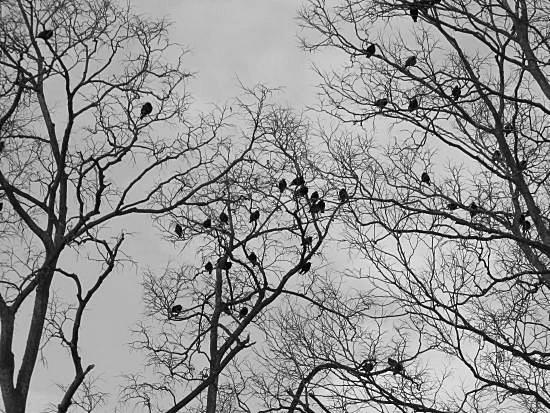
photo - mw
_______________________
All at first was the fremitus of things, the jigger of gnats, drum of the blood, fidget of leaves, shiver of light, boom of the wind. The tremor of my cry may have had something to do with choosing this threshold. There are other sills, empty places with intolerable glare, presences, noon quiet, lonely desperate desert wastes. I have died again in them. Those who go to the inhuman to place their hopes upon its alien rhythms, its bitter familiarity with nothing, its constant retreat from all that we can love, are hostages to vastation.
- Guy Davenport, C. Musonius Rufus
The Planet Formerly Known As Earth
_______________________
"No bird has the heart to sing in a thicket of questions"
- René Char
The Aesthetics Of Silence
Susan Sontag
The exemplary modern artist's choice of silence isn't often carried to this point of final simplification, so that he becomes literally silent. More typically, he continues speaking, but in a manner that his audience can't hear. Most valuable art in our time has been experienced by audiences as a move into silence (or unintelligibility or invisibility or inaudibility); a dismantling of the artist's competence, his responsible sense of vocation — and therefore as an aggression against them.
Modern art's chronic habit of displeasing, provoking, or frustrating its audience can be regarded as a limited, vicarious participation in the ideal of silence which has been elevated as a prime standard of seriousness in the contemporary scene.
But it is also a contradictory form of participation in the ideal of silence. It's contradictory not only because the artist still continues making works of art, but also because the isolation of the work from its audience never lasts. With the passage of time and the intervention of newer, more difficult works, the artist's transgression becomes ingratiating, eventually legitimate. Goethe accused Kleist of having written his plays for an "invisible theatre." But in time the invisible theatre becomes "visible" The ugly and discordant and senseless become "beautiful." The history of art is a sequence of successful transgressions.
(....)
The art of our time is noisy with appeals for silence.
A coquettish, even cheerful nihilism. One recognizes the imperative of silence, but goes on speaking anyway. Discovering that one has nothing to say, one seeks a way to say that....(more)
Aspen no. 5+6
The Minimalism issue _______________________
Silence, the Utmost in Ambiguity
Mario Perniola
Trans. from the Italian by Theodore Ell and Anthony Stephens
Comparative Literature and Culture 12.4 (2010)
... in the modern sense of the word, ambiguity is at its most intense not in words, nor in action, but in silence. To avoid any misunderstanding, when "ambiguity" is used in its more modern sense of the plurality of interpretations, I prefer to speak of the polyvalence of silence; I use the word ambiguity only when we are presented with an alternative split specifically between two elements. If we consider the history of the notion of silence, which extends over thousands of years, we find ourselves confronting an ambiguity. Over the long history of this notion, two opposing conceptions of silence, in fact, have emerged: the first associates silence with contemplation, the second with action. With some degree of inexactness, the first tendency could be defined as mystical and the second as rhetorical. For the first, silence is related to a psychological state which cannot be expressed in words, for the second silence is, by contrast, an attitude with a particular meaning. Beyond these two dominant trends there exists a third which is more difficult to define, in which the two aspects, contemplative and active, join and intersect. I explain briefly the fundamental aspects of the first two concepts and then concentrate more on those instances in which silence is configured as an attitude which is neither entirely contemplative nor entirely active, neither wholly spiritual, nor wholly practical, despite its partaking of both aspects. I would say that in these cases, the original, ancient notion of ambiguity (double meanings) and that of the modern period (a polyvalence of interpretations) reciprocally intensify one another, giving rise to an enigma.
_______________________
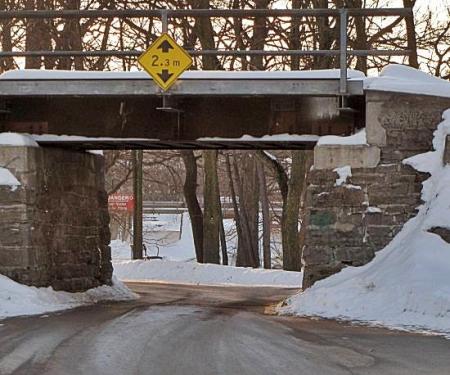
photo - mw
_______________________
#Jan25 The workers, middle class, military junta and the permanent revolution
Hossam el-Hamalawy
(....)All classes in Egypt took part in the uprising. In Tahrir Square you found sons and daughters of the Egyptian elite, together with the workers, middle class citizens, and the urban poor. Mubarak has managed to alienate all social classes in society including wide section of the bourgeoisie. But remember that it’s only when the mass strikes started three days ago that’s when the regime started crumbling and the army had to force Mubarak to resign because the system was about to collapse.
(....)
From day 1 of our uprising, the working class has been taking part in the protests. Who do you think were the protesters in Mahalla, Suez and Kafr el-Dawwar for example? However, the workers were taking part as “demonstrators” and not necessarily as “workers”– meaning, they were not moving independently. The govt had brought the economy to halt, not the protesters by its curfew, shutting down of banks and business. It was a capitalist strike, aiming at terrorizing the Egyptian people. Only when the govt tried to bring the country back to “normal” on Sunday that workers returned to their factories, discussed the current situation, and started to organize en masse, moving as a block.
(....)
At this point, the Tahrir Square occupation is likely to be suspended. But we have to take Tahrir to the factories now. As the revolution proceeds an inevitable class polarization is to happen. We have to be vigilant. We shouldn’t stop here… We hold the keys to the liberation of the entire region, not just Egypt… Onwards with a permanent revolution that will empower the people of this country with direct democracy from below…...(more)
via
_______________________
Textual Communities: Nancy, Blanchot, Derrida
Kuisma Korhonen
Culture Machine, Vol 8
The secret sense of complicity that we feel when we read in solitude, the sense that ‘there are people out there that are reading the same lines and understanding the same thing as I do’, is, in fact, mostly an illusion. In reality, we do not know what other readers get out of the text, how they interpret it, or what enjoyment they draw from it. This often becomes evident when textual communities become public, when we learn to know who our virtual reading companions were and how they actually received the book. It is always a shock when I learn that an old friend of mine, a friend whose values and thoughts I have always believed to be similar to my own, has read and understood some book in a totally different light than I. Should I doubt my judgment of the book, or my judgment of my friend? Do we live in the same world?
Do the participants of textual communities have anything in common? Or should we accept that a textual community is always a community of those who have nothing in common, a community that must not recognize itself, a community that is to come – a community that has nevertheless always already collapsed? That is no longer and not yet our community?
It seems that in order to think communities of solitary readers we need a new concept of community that is not based on the ideas of a shared time, space, or identity....(more)
_______________________
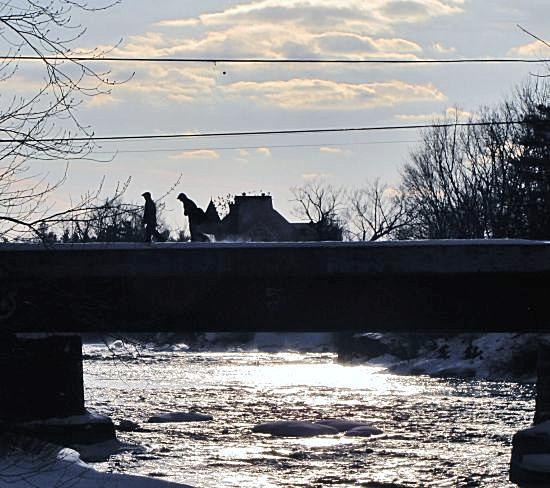
photo - mw
_______________________
from
The Phoenix And The Tortoise
Kenneth Rexroth
I am cold in my folded blanket,
Huddled on the ground in the moonlight.
The crickets cry in congealing frost;
Field mice run over my body;
The frost thickens and the night goes by.
North of us lies the vindictive
Foolish city asleep under its guns;
Its rodent ambitions washing out
In sewage and unwholesome dreams.
Behind the backs of drowsy sentries
The moonlight shines through frosted glass —
On the floors of innumerable
Corridors the mystic symbols
Of the bureaucrats are reversed —
Mirrorwise, as Leonardo
Kept the fever charts of one person.
Two Ptahs, two Muhammad’s coffins,
We float in the illimitable
Surgery of moonlight, isolate
From each other and the turning earth;
Motionless; frost on our faces;
Eyes by turns alive, dark in the dark.
...(more)
Bureau of Public Secrets
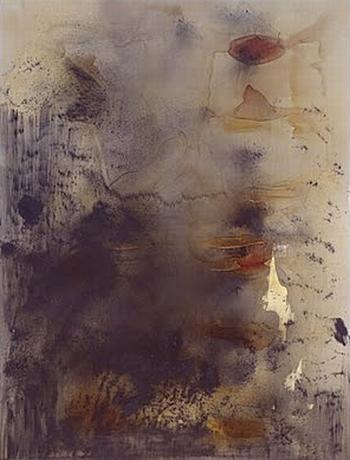
The Spirits That Lend Strength
Are Invisible III (Nickel/Neusilber)
1988
Sigmar Polke
_______________________
Of Being Numerous: Sections 1-22
George Oppen
9
‘Whether, as the intensity of seeing increases, one’s distance from Them, the people, does not also increase’
I know, of course I know, I can enter no other place
Yet I am one of those who from nothing but man’s way of thought and one of his dialects and what has happened to me
Have made poetry
To dream of that beach
For the sake of an instant in the eyes,
The absolute singular
The unearthly bonds
Of the singular
Which is the bright light of shipwreck
10
Or, in that light, New arts! Dithyrambic, audience-as-artists! But I will listen to a man, I will listen to a an, and when I speak I will speak, tho he will fail and I will fail. But I will listen to him speak. The shuffling of a crowd is nothing—well, nothing but the many that we are, but nothing.
Urban art, art of the cities, art of the young in the cities—The isolated man is dead, his world around him exhausted
And he fails! He fails, that meditative man! And indeed they cannot ‘bear’ it.
...(more)
_______________________
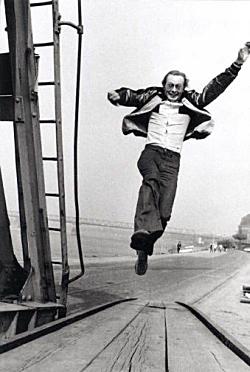
Sigmar Polke
b. Feb. 13, 1941
photo - Angelika Platen
_______________________
poodlewalks
a new photo journal by Gary Sauer-Thompson (Junk for Code)
The idea behind this lo fi photo blog is that of a visual diary: this is what I am seeing when walking.
The walking that is done with the dogs is different to my usual walks as it is much more exploratory. It is the poodles walk and I am part of the pack. Whilst the poodles check out the areas of their route for smells and food I check them out for photos.
_______________________

Physica Sacra
Johannes Jacob Scheuchzer
(1672-1733)
flickr set - greyherbert
via feuilleton - fifth anniversary edition
John Coulthart
_______________________
Fragments from the Beach
Bill Knott
(Nonasyllabics)
In retrospect the tragic nature
of sea is a taste wept too daily,
too depleted by freedom's rupture;
the eyes have other secrets to see
and deeper use for the detritus
within us: the bright effluvium
of ego dries up, mired as it is
in wealth, that remedial medium.
Blame it on fate, on beach memories--
pebble put in the pocket or shell
fragments; any memento carries
us as much as we it. Time capsule
contains every evening's interval.
The ocean observes its own puddle.
more of Bill Knott - poetry, prose and art
An Interview with Bill Knott
Memorious 6
Bill Knott at the Poetry Foundation
Bill Knott’s strong-lined sonnets
Camille Martin looks at Bill Knott, Fifty (Rhyming) Sonnets: A Selection from 1969-2009_______________________
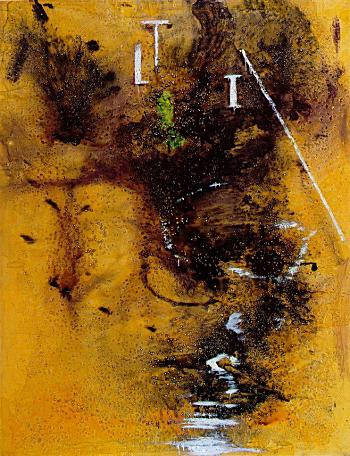
Lingua Tertii Imperii
Sigmar Polke
1983

photo - mw
_______________________
From The Spiritual Life of Replicants
Murat Nemet-Nejat
courtesy of Jerome Rothenberg
(....)
*
Windows, windows are better;
you see the birds passing by at least
instead of four walls. ....(Orhan Veli) ........passes by
*
The Eyes of Absence
Pursuing phantom pains.
Love of Words
A part of,
apart from my lover.
As words separate, I draw close
as words draw near, I fall apart.
The all sufficiency of language is a concept which,
which can only be conceived by the all powerful.
...(more)
.....................................................
More from The Spiritual Life of Replicants
brooklynrail
_______________________

Winterlude
February 4 to 21, 2011
Ottawa
photo - mw
_______________________
"Formulas & Flowers" from Book of Ruth
Robert Seydel
1960 - 2011
The mind runs poorly but is still sweet.
Self-ignorance is my house. A shell.
To wear masks put them off.
My work never comes quite to be.
As I get fatter I will sing more.
I believe in error, an aesthetics of error. Error is Arrow I’ve sd.
Maybe the bow tie swims in curled water.
I found in the flats my face.
There’s an occult meaning in initials.
What happens is not what matters. What matters is what’s here.
The planet is a hummingbird.
Reveal amber, the color of time, & the happiness of glue.
Sad men fail art relentlessly.
...(more)
Book of RuthRobert Seydel Siglio Press
Robert Seydel's Book of Ruth presents an assemblage of collages, letters, journal entries and other artifacts from the life of Seydel's fictional alter-ego, Ruth Greisman--spinster, Sunday painter and friend to Joseph Cornell.
_______________________
The Bee-Loud Glade:
An Excerpt from the Debut Novel
Steve Himmer
(....)
And the more I said through my ciphers, the less I spoke in real life. My cube was in a far corner of the department, near some filing cabinets to which the keys had been lost, so apart from occasional walks to the bathroom and my twice-daily route between front door and desk, I was easy to miss. The faces changed around me without introduction, and in time no one knew who I was. There was no director of brand awareness for me to assist, and no one asked what I was doing. I’d been forgotten, become furniture in my far corner, and that’s how I held onto the job for as long as I did even after I’d stopped writing about Second Nature and had let my online shills take on lives of their own. Their weblogs grew longer, spanned months and then years as they made projects for high school and graduated from college, grumbled or raved about various jobs, and enjoyed visits from growing grandchildren. They took trips to Hawaii and endured bouts with cancer, enjoyed good days at work and suffered through awful blind dates. Some gave birth and others died, their comment inboxes filling with sympathy notes they would never read, but I read them all. Commenters asked where flowers could be sent, and others suggested—success!—Second Nature’s own hyperefficient arrangements.
Years went by offline, too. ...(more)
_______________________
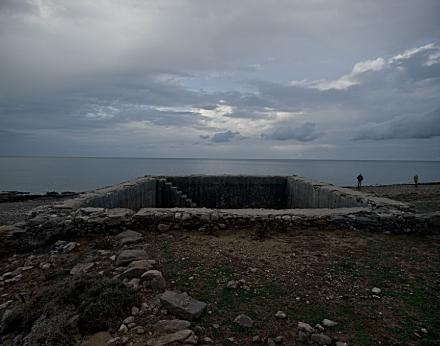
Lefka On
Mchael Roulier
Michael Roulier on Flickr
_______________________
On Italo Svevo's Zeno's Conscience
Nathaniel Rich
tin house
(....)It is a story tinged with the same sense of bitter irony that fills the pages of Svevo’s masterpiece. Zeno is one of the great novels of the twentieth century—and I believe the greatest Italian novel—yet Svevo’s legacy remains wobbly. He has the respect he sought most of his life, but not nearly the readership or renown of Joyce or Proust. Every few years, some appreciation of his work appears, or a new translation, or a film adaptation, but even in Italy he doesn’t share the firm standing of his high modernist peers. There is some mystery to this. It may reflect writing in the foreign language of literary Italian, has an almost childishly plain, straightforward style. Or perhaps his time hasn’t yet arrived. Rereading Zeno now, in our own age of business anxiety, computerization, and future dread, the novel feels as immediate as ever. The humor holds up, too: it’s an extremely funny book....(more)
_______________________
The A to Z of SPURIOUS: From Jordan to Moment of Illumination
Nathan Ihara
mobylives
The A to Z of SPURIOUS: from Mount Batten to Tohu Vavohu
Nathan Ihara
Mobylives
.....................................................
Did I say this novel was about friendship? But literature has known no better friends than Vladimir and Estragon – or, not until Lars and W. All the brow-beating, all the insults, all the expressions of existential despair – W. wouldn’t deliver this, and Lars wouldn’t put up with it, unless W. and Lars needed it, unless they were inseparable. We know they’re close not because they say it, but because we can’t doubt it. How could you question the honesty, and trust, of someone who told you your attempts to change your life remind him of “the cartoon mouse who hits the walls and then slides down it…It’s painful to see, but also funny”? “‘Conversation!’, exclaims W. That’s what friendship’s all about.” And this is a novel made up almost entirely of conversations.
- Linus Urgo, KGB Bar Lit Book Review
_______________________
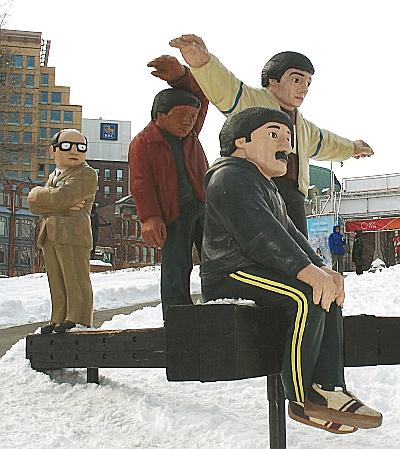
Balancing
detail
John Hooper
1926 - 2006
National Arts Centre in Ottawa
photo - mw
_______________________
Real and Fake Realism
Timothy Burke
Easily Distracted
(....)
Today’s realists are the lineal descendents of the people who felt there was no choice but to accept the permanence of similar regimes in Eastern Europe and Asia, no alternative but to pay off Mobutu, Marcos, the Shah. And these are the people who quake at “instability” and look for the next authoritarian to back, to manage the possibility of genuine change back into predictable org-chart forms of patronage and clientage. (....)
The political elites who try so hard to turn liberal democracies into dusty-dry technocracies reveal again and again that they have no real faith in the long-term revolutionary force of liberalism. Every declaration of independence, every constitution written, every proclamation of human rights, they have tried to limit or hedge or restrict those commitments before the ink on them is dry. Democracy, but not for you. Rights, but not there. Emancipation, but not so far. Free elections, but not where we need stability. And every hedge and limit condition since the 18th Century been a self-evident kludge, transparently temporary and provisional.
And so again and again, the realists, pundits and technocrats and advisors, find themselves dully amazed to be on the wrong side of history, staring forlornly from a ditch at the side of the road as their ride disappears into the distance....(more)
_______________________
fait accompli's 8th birthday!
Congratulations and thanks - mw
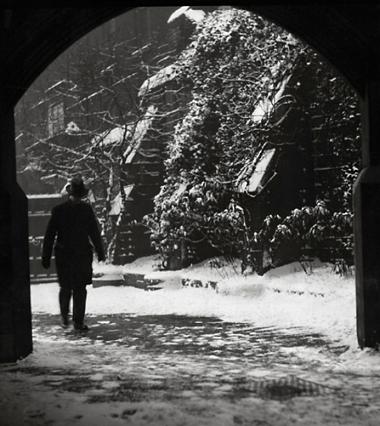
Winter Scene, Temple
1929
E. O. Hoppé
Bruce Silverstein Gallery
via
_______________________
I have this nagging sensation that we’re all displaced agrarians, and the land is fast becoming more rebuke than respite. To live on such a planet as this, we should be ashamed, yes, but how deeply ashamed, and for which of how many reasons? To be a tourist in the very land I’ve raped; is that my moral compass (see also Adam and Eve)? Dunno, but it sure has the ring of purgatory.
-
Todd Boss
A Shifting Sense of Place
Four contemporary poets discuss where their work belongs in the world.
Jeremy Richards
In his classic book Art as Experience John Dewey writes, “At every moment the living creature is exposed to dangers from its surroundings, and at every moment, it must draw upon something in its surroundings to satisfy its needs.” Dewey theorized that all art is metabolized through experience and our immediate environment, “not externally but in the most intimate way.” In their anthologized visions of place, classic poets could stroll through an orchid garden, stumble past a church, or kneel in the grass and feel sated and grounded. But today, where is the poet’s sense of place? Itinerant, polluted, untethered? Tweeted and Foursquared? Or is it still Romantic, still finding solace in nature, tripping over the transcendent on every morning stroll? I recently interviewed a few American poets with a distinct sense of place—particular to their surroundings but informed by their historical, literary, and political contexts—to find out where they are and how they see it. ...(more)
_______________________
…and life went on and on and on, like a necklace of rice grains, on each grain of which a landscape had been painted, tiny grains and microscopic landscapes, and I knew that everyone was putting that necklace on and wearing it, but no one had the patience or the strength or the courage to take if off and look at it closely and decipher each landscape grain by grain, partly because to do so required the vision of a lynx or an eagle, and partly because the landscapes usually turned out to contain unpleasant surprises like coffins, makeshift cemeteries, ghost towns, the void and the horror, the smallness of being and its ridiculous will…
-Robert Bolano, from By Night In Chile
at The Planet Formerly Known As Earth
_______________________

E.O. Hoppé
_______________________
DADA, SURREALISMS, FUTURISMS
collected at Ubuweb :: Papers
.....................................................
Dada et la Musique
Produced by the Centre Pompidou in France
Includes works by: Satie, Germaine Albert-Birot, Hugo Ball, Honegger, Tristan Tzara, Cyril Scott, Jean Arp, Schonberg, Poulenc, Kurt Schwitters, George Antheil, Marinetti, Vincente Huidobro, Milhaud, Max Ernst, Raoul Haussman, Erwin Schulhoff, Richard Huelsenbeck.
exp etc
_______________________
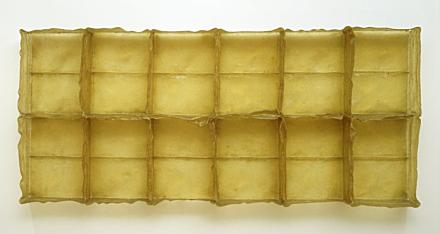
Sans II
1968
Eva Hesse
1936 - 1970
7.5 Minute Talk on Eva Hesse’s Sans II
Lisa Robertson
With + Stand 4
The Lisa Robertson Issue
(....)
An index of negative space as serial, actual, historical, without central organizing
principal, lifts into view the exuberantly metaphorical activity of negation, where a
metaphor is a synthesized mental space in which one is sometimes lodged.
But the metaphorical space can’t be inhabitable without welcoming meaning’s propensity to move across materials: metaphorical meaning does not identify itself with a position, it moves in a fluctuation, serially, to indicate modes of materiality.
Without forgetting the speed of resin—the structuring gesture must be truncated, definite, minimal, so as to complete itself before the setting moment of the material. So time enters the work in two ways: in the gestural present of making, and in the durational time of deterioration, given Hesse’s choice to work with unstable materials. No: it enters the work in three ways, the third being the time of a haunting.
Without any direct relation to the French writer Georges Perec, born like Hesse in 1936, whose techniques of constraint indicated by an elision the specific loss suffered by European Jews. La Disparition. The disappearance.
Perec, a holocaust orphan, had, in 1968, finished writing a novel without E’s. Sans eux.
Without them. Mother, Father, Parents.
Without assuming that this cipher encoded in the text isn’t anything but the iteration of the work of mourning, at the same time that this mourning is lived at the level of a general truncation of language, a set of avoidances dictated by history, not by a game of aesthetic affiliations.
Without ever finding a way to utter this absence other than by using it as a mould.
Sans II is a perceiving device that functions without regard for the conventional antitheses of presence and absence, inside and outside, subject and world. The volute relationship of mould to casting actively inverts the prejudice for the mutually exclusive positioning of binaries, so that the edge, the surface of their contact, once occult, secretive, extroverts to enter a serial luminosity, where absence is not the opposite of presence, but its theatre, its frame of appearing.
Matter is pitiful; Form is terrible; in the sculptural work Negation is luminous and
temporary.
Lisa Robertson on Eva Hessevideo
‘75 Reasons to Live’
videos
Sfmoma | Open Space "during SFMOMA's three-day 75th anniversary celebration, 75 people from the Bay Area creative community gave extremely short talks - 7.5 minutes or less! - on a single collection work of their choosing. Someone called it "manic splendor" - and it was. You can follow the 75 Reasons to Live talks as we post them by checking in here."
via_______________________
Democracy in What State?
Giorgio Agamben, Alain Badiou, Daniel Bensaid, Wendy Brown, Jean-Luc Nancy, Jacques Ranciere, Kristin Ross, and Slavoj Zizek
Columbia University Pres
excerpts
_______________________
"The fight for language is a political fight."
The Notebooks
Steve McCaffrey
L=A=N=G=U=A=G=E 9/10, 1979
via Al Filreis
_______________________
Edward Said: A Legacy of Emancipation and Representation
Adel Iskandar and Hakem Rustom
mediafire pdf
_______________________
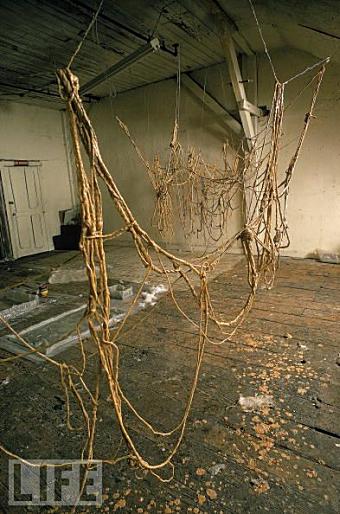
rubber dipped string and rope
Eva Hesse
Henry Groskinsky/Time & Life Pictures/Getty Images
Jan 01, 1969
Eva Hesse: her dark materials
Wax, cheesecloth, latex: a rare show of Eva Hesse’s unusual work reveals how she exploded the idea of sculpture.
Alastair Sooke
_______________________
From: Caesura
Habib Tengour
translated by Pierre Joris
brooklyn rail
(....)
1.a.
The peak wherin exchange and change culminate without the rhythm being broken nor the word polluted.
The time of a breath ...
The evidence of the trait surprises you as it would at the river's ascent. A light appears in the suspense. Blinding, but tenuous. The images reveal themselves, all equal, measured by the yardstick of a trace on the way to extinction.
Here and there blackened stones.
Deserted debris.
Another detour to interrogate the time tested remains is out of the question. That ash still persists in the rock leaves the visitor perplexed. Words erupt, lust-laden, making the pommel list. "You slaughter my camel and my honor, she says. I will not give myself ..."
You get carried away on the slipstream without measuring the weight of an exile.
An oscillation of short duration.
The report is a flaw of eloquence there where forgetting bounds the name.
...(more)
_______________________
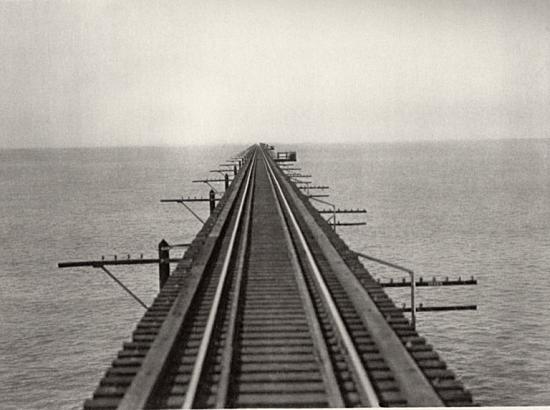
The Keys
Florida
1926
E.O. Hoppé
(1878-1972)
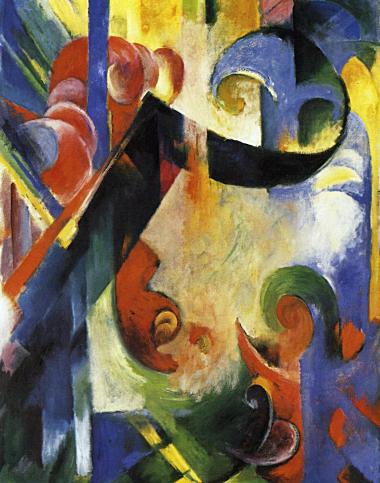
Broken Forms
1914
Franz Marc
b. Feb. 8, 1880
_______________________
One Art
Elizabeth Bishop
b. Feb. 8, 1911
The art of losing isn't hard to master;
so many things seem filled with the intent
to be lost that their loss is no disaster.
Lose something every day. Accept the fluster
of lost door keys, the hour badly spent.
The art of losing isn't hard to master.
Then practice losing farther, losing faster:
places, and names, and where it was you meant
to travel. None of these will bring disaster.
I lost my mother's watch. And look! my last, or
next-to-last, of three loved houses went.
The art of losing isn't hard to master.
I lost two cities, lovely ones. And, vaster,
some realms I owned, two rivers, a continent.
I miss them, but it wasn't a disaster.
---Even losing you (the joking voice, a gesture
I love) I shan't have lied. It's evident
the art of losing's not too hard to master
though it may look like (Write it!) like disaster.
_______________________

Robert Burton
b. Feb. 8, 1577
The Anatomy of Melancholy
_______________________
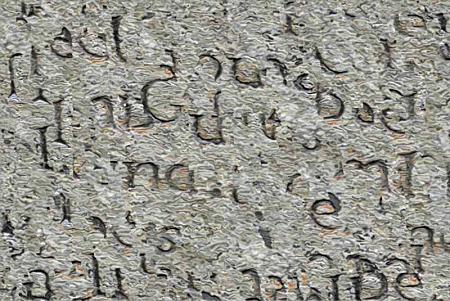
slumber II
Peter Ciccariello
invisible notes
_______________________
Allegories of Reading: Figural Language in Rousseau, Nietzsche, Rilke, and Proust
Paul de Man
mediafire pdf
_______________________
Recognizing the Language of Tyranny
Chris Hedges
truthout
Empires communicate in two languages. One language is expressed in imperatives. It is the language of command and force. This militarized language disdains human life and celebrates hypermasculinity. It demands. It makes no attempt to justify the flagrant theft of natural resources and wealth or the use of indiscriminate violence. When families are gunned down at a checkpoint in Iraq they are referred to as having been “lit up.” So it goes. The other language of empire is softer. It employs the vocabulary of ideals and lofty goals and insists that the power of empire is noble and benevolent. The language of beneficence is used to speak to those outside the centers of death and pillage, those who have not yet been totally broken, those who still must be seduced to hand over power to predators. The road traveled to total disempowerment, however, ends at the same place. It is the language used to get there that is different.
This language of blind obedience and retribution is used by authority in our inner cities, from Detroit to Oakland, as well as our prison systems. It is a language Iraqis and Afghans know intimately. But to the members of our dwindling middle class—as well as those in the working class who have yet to confront our new political and economic configuration—the powerful use phrases like the consent of the governed and democracy that help lull us into complacency. The longer we believe in the fiction that we are included in the corporate power structure, the more easily corporations pillage the country without the threat of rebellion. Those who know the truth are crushed. Those who do not are lied to. Those who consume and perpetuate the lies—including the liberal institutions of the press, the church, education, culture, labor and the Democratic Party—abet our disempowerment. No system of total control, including corporate control, exhibits its extreme forms at the beginning. These forms expand as they fail to encounter resistance.
The tactic of speaking in two languages is as old as empire itself....(more)
_______________________
'We like them bitches on the chessboard'
Tragedy, Politics and The Wire
Mark Chou
ctheory
In this essay, I will conduct an analysis of The Wire through the lens of Greek tragedy in order to draw out and explore one of the series' central concerns: the political, economic and social decay confronting America today. My analysis will proceed in two broad steps: in the first section, I will briefly draw together the popular literature linking The Wire with Greek tragedy that has emerged in such outlets as the New Yorker, The Atlantic and Time Magazine. Numerous commentators, even series creator David Simon himself, have acknowledged Greek tragedy as one of the core guiding inspirations behind the creation of The Wire. Despite this, no scholarly analyses have yet examined the nature of these claims in full. Speaking to this oversight, I will read The Wire as a modern-day Greek tragedy in the essay's second section. I borrow from a framework established by UC San Diego classicist Page duBois in her seminal New Literary History article, "Toppling the Hero: Polyphony in the Tragic City". The rationale for this choice is because her conception and analyses of Greek tragedy draw out its capacity to offer us "more than nostalgia for the private, individual subject of modernity, cherished or lamented by many readers precisely because it is receding in a world of postmodern globalization." This being the case, it may be worth our while to reread and revive these ancient texts, perhaps as The Wire has done, given how aptly they seem to capture the latent mood of our own times. ...(more)
_______________________
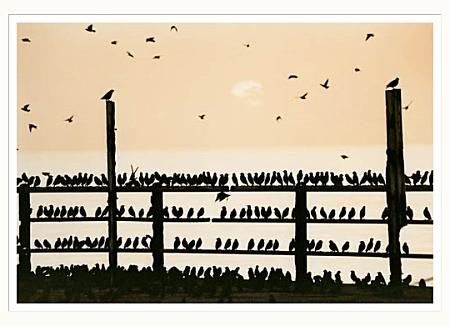
West Pier
Brighton
Tim Rudman
via
_______________________
Confession Of One Who Flew
A. M. Pires Cabral
Translation by Richard Zenith
1.
But if in these six and a half decades
I was capable of some sort of flight
– which could only have been comparable
to the awkward and rudimentary flight
of chickens, with a great expenditure
of energy to achieve brief and desperate
moments of scant ascension,
but a kind of flying all the same,
by which I managed to stay aloft
in my lighter moments –
now, that cycle of flight having ended,
I must perch, the way birds do.
This isn’t like when a shop
changes its line of business
or closes to take inventory
at year’s end.
Nor is it like carrying out
an arrest warrant
or atoning for the disorderliness
of being a pedestrian who flew.
Nor is it the inevitable conclusion
to an act of sedition.
Perching, that’s all. Returning
to the endearing things of earth.
It’s the earth finally claiming what I owe her
and my claiming what she owes me
since my very first hour.
I flew, I’m flown out.
Without nostalgia.
...(more)
A. M. Pires Cabral at Poetry International Web
via the page
_______________________
Three Stories
J.C. Hallman
Exquisite Corpse
The Epiphenomenon
The average man is not what he used to be. At first, he thinks this is normal. The average is a function of time and one can reasonably expect to remain average only for so long. In history’s current predicament the average man is slightly past his prime. He is fully aware of is. There is age and decay to consider. Yet when the average man wakes on a spring morning in a wet season his thought is this: I am not what I used to be.
The average man looks in the mirror more often than he cares to admit. Doing so this morning, he spots nothing that can account for the vaguely run down feeling, not quite disease, not quite exhaustion, something more spectral and unaccountable. The average man consults his wife at such moments of doubt, as, though he is loath to admit it, her instincts in these matters tend to be better than his own.
“You’re paranoid,” she says. “That’s so like you. That’s your forte, your favorite thing. The only time I’m surprised is when you feel fine, which you should, obviously, more often. I imagine it’s common for men of your age and disposition to think they are less than what they once were. Which does not mean there’s nothing wrong with you. I’ve held that opinion for quite some time, actually. Rather, I expect that whatever phenomenon you are experiencing afflicts millions of men like yourself and perhaps even more.”
The average man does not agree with his wife’s diagnosis, but he remains quiet. ...(more)
_______________________
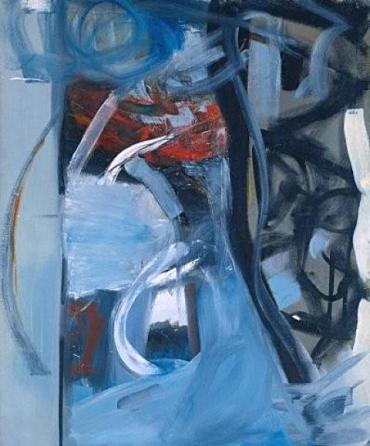
Lost Mine
1959
Peter Lanyon
Peter Lanyon
b. Feb. 8, 1918
_______________________
fizzle 3
Afar a bird
Ruinstrewn land, he has trodden it all
night long, I gave up, hugging the hedges,
between road and ditch, on the scant grass,
little slow steps, no sound, stopping ever and
again, every ten steps say, little wary steps, to
catch his breath, then listen, ruinstrewn land, I
gave up before birth, it is not possible other-
wise, but birth there had to be, it was he, I was
inside, now he stops again, for the hundredth
time that night say, that gives the distance
one, it's the last, hunched over his stick, I'm
inside, it was he who wailed, he who saw the
light, I didn't wail, I didn't see the light, one on
top of the other the hands weigh on the stick,
the head weighs on the hands, he has caught
his breath, he can listen now, the trunk
horizontal, the legs asprawl, sagging at the
knees, same old coat, the stiffened tails stick
up behind, day dawns, he has only to raise his
eyes, open his eyes, raise his eyes, he merges
in the hedge, afar a bird, a moment past he
grasps and is fled, it was he had a life, I didn't
have a life, a life not worth having, because of
me, it's impossible I should have a mind and I
have one, someone divines me, divines us,
that's what he's come to, come to in the end, I
see him in my mind, there divining us, hands
and head a little heap, the hours pass, he is
still, he seeks a voice for me, it's impossible I
should have a voice and I have none, he'll find
one for me, ill beseeming me, it will meet the
need, his need, but no more of him, that
image, the little heap of hands and head, the
trunk horizontal, the jutting elbows, the eyes
closed and the face rigid listening, the eyes
hidden and the whole face hidden, that image
and no more, never changing, ruinstrewn land,
night recedes, he is fled, I'm inside, he'll do
himself to death, because of me, I'll live it with
him, I'll live his death, the end of his life and
then his death, step by step, in the present,
how he'll go about it, it's impossible I should
know, I'll know, step by step, it's he will die, I
won't die, there will be nothing of him left but
bones, I'll be inside, nothing but a little grit, I'll
be inside, it is not possible otherwise,
ruinstrewn land, he is fled through the hedge,
no more stopping now, he will never say I,
because of me, he won't speak to anyone, no
one will speak to him, he won't speak to
himself, there is nothing left in his head, I'll
feed it all it needs, all it needs to end, to say I
no more, to open its mouth no more, confu-
sion of memory and lament, of loved ones and
impossible youth, clutching the stick in the
middle he stumbles bowed over the fields, a
life of my own I tried, in vain, never any but
his, worth nothing, because of me, he said it
wasn't one, it was, still is, the same, I'm still
inside, the same, I'll put faces in his head,
names, places, churn them all up together, all
he needs to end, phantoms to flee, last phan-
toms to flee and to pursue, he'll confuse his
mother with whores, his father with a road-
man named Balfe, I'll feed him an old curdog,
a mangy old curdog, that he may love again, lose again,
ruinstrewn land, little panic steps
Samuel Beckett
(Translated by the author)
Samuel Beckett poems
presented by Mark Sullivan

Bogners Grocery
1960
Fred Herzog
Equinox Gallery Vancouver
via
Vancouver flashback
Fred Herzog’s history-making photographs have documented the changing city in 80,000 frames
Brian Lynch _______________________
This is a five-part essay
Parmanu review of Orhan Pamuk's My Name Is Red
(....)
How do I review a book with pages where every sentence is a story, and where, as you move from one sentence to next you leap from one magical world to another, until, crossing this maze of stories and worlds, you begin to wish it continues forever?
From what viewpoint do I review a work that is conveyed not only through words of people like you and me, but also as the sermon of a Dog, the lament of a Tree, the adventures of a Gold Coin, the boast of colour Red, the lecture of a proud Horse, the tale of two Dervishes, and the revelation of Satan himself?
How do I guide you through a book that transports you into the middle ages, through the winding streets of sixteenth-century Istanbul inhabited by blind beggars who know intimate details of who crossed their path, with whom, carrying what; by clothes peddlers with a bundle of clothes on their back and letters tucked to their waist, carrying love-notes from not one but many prospective husbands to the woman they love; by moneylenders who identify counterfeit gold coins by biting into them; by storytellers who entertain miniaturists after midnight in coffeehouses tucked away in remote corners; by Janissaries, those Turkish soldiers feared by all?...(more)
_______________________
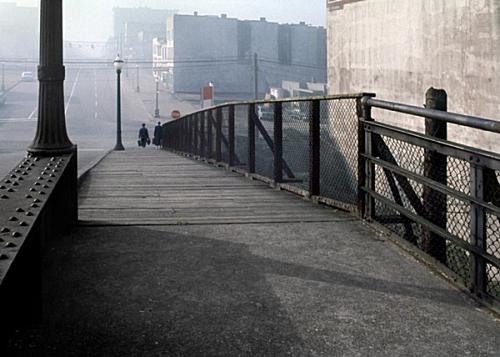
CN Bridge Main
Fred Herzog
1966
_______________________
Hallucinations of Invisibility: From Silence to Delirium
Ted Hiebert
ctheory
As the quest for understanding is revealed as a constructed improvement in the wrong direction, urged on by the currents of social and cultural automata -- the undercurrent reveals a fantasmatic inversion of consciousness itself, as hallucination: the ultimate simulacrum of experience.
We are no longer in the process of disappearing. Rather, we have already disappeared. Everywhere we look for signs, not that we are still here, but that our disappearance was not inevitable -- that it 'could have been' different -- as though if we had somewhere made a mistake we could live with the consequences. Yet if such could ever have been the case there is no trace of it left. What we encounter is not an acceleration towards disappearance but only the realization that we never were. It is not our disappearance that was evitable -- but only our appearance in the first place.
(...)
And so we come full circle from where we began. It is no longer us asking the universe for the meaning of life, but the universe who quietly asks us. With a smile, but without irony, we reply simply that we have forgotten....(more)
Ted Hiebert
artist portfolio & website _______________________

Dante and Virgil
on the Ice of Kocythos
1774
John Henry Fuseli
b. Feb. 7, 1741
_______________________
As language. . .Silence is also a language.
When there is no order in heaven
we make what we make
by luck, or strength,
or the composition of desire.
Power grows
like vegetation,
and there are no preferences under heaven.
I do not know why a leaf should be of less worth
than a Vatican,
or why builders care.
The mathematical stones recite their logic
of cruelty and despair
we arose to gratify some searchless reason
shaping the empty air.
Louis Dudek
b. Feb. 6, 1918
_______________________

Bedford Mills
photo - mw
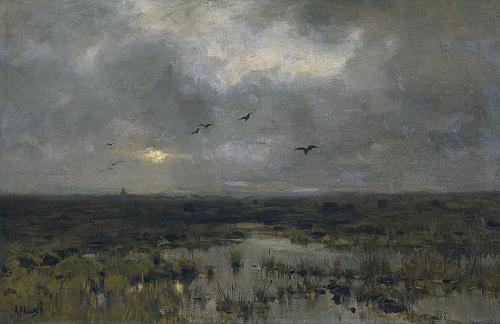
morass
1885
Anton Mauve
d. Feb. 5, 1888
_______________________
(m)other words
Tzveta Sofronieva
Translated from the German by Chantal Wright
exqisite corpse
The places inside me edge closer and closer together and each new place holds something familiar. These places form layers, merge into a single place. Words and stories, buildings and events begin to merge. More than ever, Europe's face is characterised by the features of a new intercultural nomadism and its many languages. The golden and sunlight-flooded, iron and ice crystal-illuminated spaces of Europe's languages are becoming porous, cloaking places with delicate webs of understanding. Meanings, varying forms of sensual perception and traces of lexical memory mingle in these webs. Misunderstandings both tragic and comic, of a surreal dream- (and nightmare-) like quality, banal and political, arise between different cultures and between individuals. We often believe we can free ourselves from geography through globalisation. But it reveals itself in the history of places, it is reflected in their linguistic imagery, no matter which language is being used to communicate.
Conversations between cultures are becoming ever more important, conversations about how we communicate with each other and how we translate culture, about whether words form a gulf between us or allow us to build bridges. The space in-between, inhabited by words from many languages, is growing. My most marked experience of this space began when I took up residence in the German language.
often i ask myself in the dark whether you feel
the glitter of words and see their souls unfurled
I wrote in 1991 in a poem about language, and continued:
[...] on the islands of my soul
play torture me the words shadows the souls of my tongue
untranslatable into verses or into your tribe's tongues
...(more)
_______________________

Narrows weir
photo - mw
_______________________
Rearview Mirror & other poems
Sean Patrick Hill
exquisite corpse
The Hours
I had slept alone for weeks.
Days when rain made idle threats
I climbed the California hills,
And not even poison oak
Could offend me.
This was after the floods.
This was during my breakdown.
Mud stained the roads
Like a bad memory.
There was always an old farm
At the edge of the sea
I could occupy for an hour.
I was just remembering houses
I died in.
How my grandparents ate Sunbeam
White bread,
Whose loads my truck-driving uncle
Agreed to bear.
I was just saying what I wanted.
I knew I couldn’t have it.
So I walked out past the barn,
Onto Tamales Point,
The one clear day that year.
The sky torn open like lace.
The land like a bridge that forgot
Where it was going, a fist
Swinging at the sea.
There are elk there, but they mean nothing.
No one in my family kept horses, so
Nothing compares.
What matters are the hours, like frightened birds.
The way the land ends at the sea and says,
What’s done is done.
The way the sky just keeps walking
Where you can’t follow.
...(more)
Sean Patrick Hill's blog (The Imagined Field) has lots of links to his poetry available on-line.
The Imagined Field
Sean Patrick Hill
Paper Kite Press
_______________________
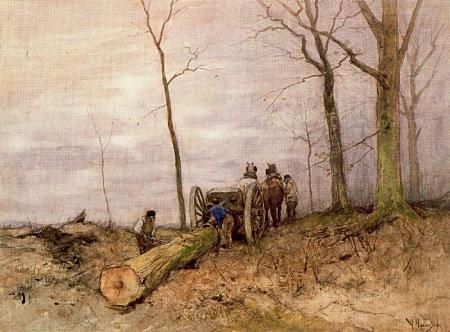
Anton Mauve
_______________________
“Creative Destruction: Ruins, Narrative, and Commonality”
Jon Beasley-Murray
Prologue to Rodrigo Naranjo,
Para desarmar la narrative maestra:
Un ensayo sobre la Guerra del Pacķfico
(....)For Marx and Engels, the effects of capitalism’s creative destruction are epistemological as much as they are social, political, or economic. “All that is solid melts into air,” as they famously observe, “all that is holy is profaned, and man is at last compelled to face with sober senses his real condition of life and his relations with his kind” (38-39). Intrinsic or extrinsic to capitalist production, it is crisis that allows us to see the truth of bourgeois society--and perhaps the preconditions of any society--clearly for the first time. The continual catastrophes that mark modernity allow an opening to capital’s posthegemonic kernel: every trace of ideology is swept away. Indeed, all narratives are briefly disrupted and we are left with a glimpse of what Giorgio Agamben would call bare life. Not only therefore does creative destruction do away with the oppressive social structures of the past: for all the neoliberal dictum that in the face of disaster “there is no alternative” to free-market deregulation, it also suggests that capitalism may not be the only beneficiary of the very crises that it lives and breathes. Catastrophe offers a turning point. It provides space for the rearticulation of well-worn mantras, which may gain renewed purchase when our defenses have been downed. It may also subsequently provide a mythic origin for new narratives and new articulations, perhaps more sinister than hitherto. But further, crisis has the potential to allow something genuinely unheralded (if perhaps long felt) to emerge: in laying bare what Marx and Engels term man’s “relations with his kind,” it reveals what we have in common. However much it hits some more than others, the propensity to be touched by calamity is ultimately a condition that we have in common with others. Moreover, disaster tends to exert a brute levelling, to provoke shared affects and induce fellowship. So as Rebecca Solnit argues, “extraordinary communities” are built on the very ordinary experience of common practices and habits that emerge out of destruction....(more)
Posthegemony: Political Theory and Latin America
Jon Beasley-Murray amazon
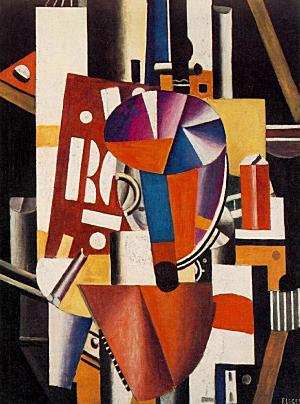
The Typographer
1919
Fernand Léger
b. Feb. 4, 1881
_______________________
"[B]odies are never event bound and event defined, but event defining -- and always at the point of becoming. This is a continual shudder across our work -- the body as an ever-receding event horizon. A hole in the fabric of the world, a non-alibi, a white hole."
-- Einstein's Brain Project
Body from the Machine: the spectral flesh [pdf]
Alan Dunning and Paul Woodrow
Proceeding of the Digital Arts and Culture Conference, 2009, University of California, Irvine
Digital Inflections: The Einstein's Brain Project
Alan Dunning and Paul Woodrow in conversation with Ted Hiebert ctheory
_______________________

Tsuguharu Foujita
1886 - 1968
photo by André Kertész
1928
via
_______________________
The Man Whose Pharynx Was Bad
Wallace Stevens
The time of year has grown indifferent.
Mildew of summer and the deepening snow
Are both alike in the routine I know:
I am too dumbly in my being pent.
The wind attendant on the solstices
Blows on the shutters of the metropoles,
Stirring no poet in his sleep, and tolls
The grand ideas of the villages.
The malady of the quotidian . . .
Perhaps if summer ever came to rest
And lengthened, deepened, comforted, caressed
Through days like oceans in obsidian
Horizons, full of night's midsummer blaze;
Perhaps, if winter once could penetrate
Through all its purples to the final slate,
Persisting bleakly in an icy haze;
One might in turn become less diffident,
Out of such mildew plucking neater mould
And spouting new orations of the cold.
One might. One might. But time will not relent.
via
_______________________

Tsuguharu Foujita
_______________________
Interview: Justin Smith on his new book "Divine Machines: Leibniz and the Sciences of Life"
New APPS
JS on 'use-mention distinction'
This is not just terminological quibbling: it is rather a necessary part of working one's way back into the problems that early modern philosophers faced, rather than allowing ourselves to update their problems so that they come out as more familiar to our own world of concerns than they in fact are. I certainly take this task to be a necessary and incontrovertible part of history-of-philosophy scholarship. The branch of philosophy that interests me is what was called at the time 'natural philosophy', which would later be sliced off and partitioned into biology, chemistry and other concrete 'sciences'. If we take actors' categories seriously, then, when we do the history of biology or chemistry we are willy-nilly doing the history of philosophy.
(....)
JS on his current project
In my new project I’m still trying to bring some of the insights of recent history-of-science scholarship to bear on our understanding of what was really going on in early modern philosophy. In particular, I’m trying to show how what we might call early modern ‘globalization’ –the most important moment of which was the encounter with the New World-- impacted the scope and methods of a number of domains of natural philosophy, including taxonomy (along with the background nominalism-vs.-realism debate), philosophical anthropology (along with the background debates about human nature), and even mathematical physics (in the discovery of the problem of magnetic variation, for example, early modern philosophers had to face the fact that universal physics would always remain modulated by local differences). The project is called ‘Nature, Human Nature, and Human Difference: Early Modern Philosophy in Global Context’. Again, much of it is simply an attempt to bring important insights of professional historians to the attention of historians of philosophy. Just to mention one game-changing work, I think Hal Cook’s Matters of Exchange: Commerce, Medicine and Science in the Dutch Golden Age has profound implications, which ought to be of interest to philosophers, for our understanding of emerging notions of objectivity and universal validity in early modern thought. I see my work as an attempt to mediate between historians of science and philosophers who work on early modern figures, to bring these two scholarly communities together. They need to talk.
...(more)
Divine Machines: Leibniz and the Sciences of LifeJustin E. H. Smith Princeton University Press
Justin Erik Halldór Smith
New APPS: Art, Politics, Philosophy, Science
A group blog with people from all over the map.
_______________________
loss in reverse
PoemTalk's 40th episode - on Dementia Blog by Susan Schultz.
Dementia Blog
Susan M Schultz
Singing Horse Press
Susan Schultz reading from Dementia Blog
PennSound
_______________________
Marketing, Consumption and Surveillance
Surveillance and Society
Vol 8, No 3 (2011)
edited by Jason Pridmore and Detlev Zwick
_______________________
Theory Now
South Atlantic Quarterly Winter 2011
ifile pdf
_______________________
Folkstreams » The Best of American Folklore Films
A National Preserve of Documentary Films about American Roots Cultures
streamed with essays about the traditions and filmmaking. The site includes transcriptions, study and teaching guides, suggested readings, and links to related websites.
_______________________
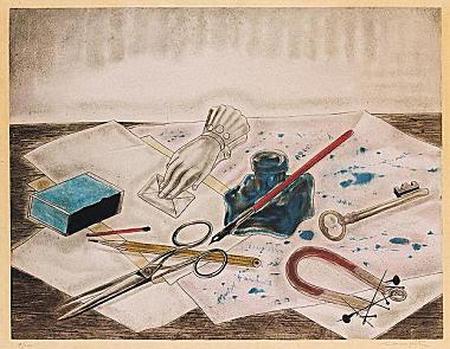
Tsuguharu Foujita
circa 1930
_______________________
At South Elmham Minister
R.F. Langley
1938 – 2011
Talk to mother. Speak in a natural
easy voice, cruising the words. Cirrus and
thistles. Thiskin. Largesse. Debonair. Then
oaks and hornbeams and forever. Say that
oaks and hornbeams have been here forever,
in place, in motion, so what is it could
make us jealous? They strew largesse, each bit
of trash confirmed on its shadow. The clouds
likewise. The trees move on them. Cirrus roves
and curls. Tell her so. Pieces of mother.
We pinch the heads of the meadow thistles
so we can sniff honey on our fingers,
discovering mother, come in tatters,
pounced by thistles, brushed by shadows, all in
rapport, mother in her own ways. Thiskin.
We move on south, through the Snappage, into
Minster. We have nothing in the down. We
down nothing in the have. No debt and no
custody. Heyday and hurry ahead
every step of the way. In Sand Pit Close
two hares are chased by a black dog. They go
stiff-legged, ears up, only cruising, mild and
easy. Later, forth with all, they fool their
time away, flare, flaunt themselves, forget the
dog and punch the air, or ho, upstarted,
erect, distinct, and checked as the twelve stars
in the winter night, under the feet of
Orion. Clever in an empty space.
Come on, Keep moving. Hold the voice and line
length steady. Say that mother is out there,
and she is thiswise, thissen, thiskin, which
is thistles, cirrus cruising de bonne aire.
R.F. Langley poems at PN Review
R. F. Langley / Gerard Manley Hopkins John Latta Isola di Rifiuti
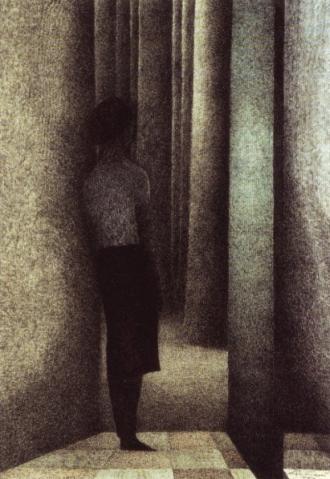
The Open Door
1945
Léon Spilliaert
1881-1946
Solitude
Weimar
_______________________
FragLit » 2010 :: Issue 7/Fall :: Solitude
The Day
Spurious
FragLit
Again: whisper it: it spreads your life like a reflection on a night window, black and bottomless. The void that calls writing forward; the black blood that surges before the beginning.
::
It is early now—or very late—and I cannot sleep. It is very late; it’s early. No dawn—not for a few hours. I hear the rushing of water from the kitchen—somewhere a pipe has broken. Somewhere it is leaking still, for all that the water company came out yesterday. I hear the heating coming on and then turning off again, and the crack of the water bottle from which I drank snapping back into shape.
I am awake now, as only writing can awaken me. Who writes? The river that looks to find itself—to return flowing to flowing, breaking apart the funerary flowers, and carrying away the ashes of the dead. To return to itself: as though writing wanted only to complete a circuit, to come back to itself by recounting a life, and the stories that speak of that life.
::
I lost my place in the night; I slipped from my place and all places. I should be asleep; I am not asleep. I should be dreaming, and my dreams anchored by my sleeping body, but I do not sleep and if I dream, it is merged with my wakefulness. It is very late or very early; this is the crossroads of the night where the soul wanders from its home.
...(more)
_______________________

Dreaming Walls
photographs by Lucia Ganieva
text by Jim Casper
lens culture
In a small, remote village in the Udmurt Republic of Russia, photographer Lucia Ganieva discovered a wonderful anomaly in home decoration — the interiors of practically every home in the village feature room-size photographic murals of “exotic” scenes, which symbolize the distant places that the home-dwellers will never visit, except in their dreams.
_______________________
Ten Poems
Changming Yuan
exquisite corpse
Human Culture
when i wake up
and open my eyes
i see all my dreams
bounced back from the frames
when i take a shower
and start to sing
i taste my song tart
behind the blurring curtain
when i strive to step
out of my humble house
i feel fences quarreling hard
in the whole neighborhood
when i visit around and
do some blind sightseeing
i smell blood stained
along the castle foot
finally i flee from this world
and hide myself far away
i still seem to hear
the glaring cries from the great wall
delicately hung is this earth
a bluish cage in the universe
...(more)
_______________________
Words without Borders
February 2011: International Graphic Novels: Volume V
_______________________
Photography as digital storytelling #ds106
resources for the DS106 class session on Photography in Digital Storytelling at UMW, Feb. 1, 2011
via
_______________________
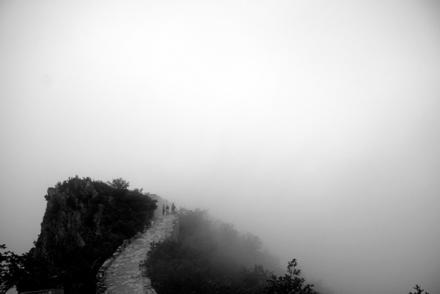
Three friends pause to chat
on the Great Wall, China.
Tim Wu
The Slow-Photography Movement
What is the point of taking pictures?
Tim Wu slate
... while taking photos has become a way to mark almost any moment, there is often an unnoticed tradeoff. Photography is so easy that the camera threatens to replace the eyeball. Our cameras are so advanced that looking at what you are photographing has become strictly optional. To my surprise, no monument I saw in Israel could compete with the back of the camera. What gets lost is the idea that photography might force you to spend time looking at what is in front of you, noticing what you might otherwise ignore.
All this has spawned a rebellion that I consider myself part of: Call it the slow-photography movement.
(....)
... the real victim of fast photography is not the quality of the photos themselves. The victim is us. We lose something else: the experiential side, the joy of photography as an activity. And trying to fight this loss, to treat photography as an experience, not a means to an end, is the very definition of slow photography. ...(more)
.....................................................
Essay: Slow Photography in an Instantaneous Age
Fred R. Conrad
lens - nyt
_______________________
The A to Z of SPURIOUS: From Golem to The Infinitesimal Calculus
Nathan Ihara
Mobylives
_______________________
UbuWeb Top Ten for February 2011
_______________________
A Bit Rich: [pdf]
Calculating the real value to society of
different professions
In this report nef (the new economics foundation) takes a new approach to
looking at the value of work. We go beyond how much different professions are
paid to look at what they contribute to society. We use some of the principles
and valuation techniques of Social Return on Investment analysis1 to quantify
the social, environmental and economic value that these roles produce – or in
some cases undermine.
Our report tells the story of six different jobs. We have chosen jobs from across
the private and public sectors and deliberately chosen ones that illustrate the
problem. Three are low paid – a hospital cleaner, a recycling plant worker and
a childcare worker. The others are highly paid – a City banker, an advertising
executive and a tax accountant. We recognise that our incentives are created
by the institutions and systems around us. It is not our intention therefore, to
target the individuals that do these jobs but rather to examine the professions
themselves.
Why Do People Who Work in Finance Earn So Much More Than the Rest of Us?
Les Leopold
_______________________
The Arab Spring:
The Contradictions of Obama's Charismatic Liberalism
Arthur Kroker
ctheory
_______________________

Land of birches
Lucia Ganieva
via
_______________________
The Empty Press Room - How Corporate Journalism Happily Lost Interest in Climate Change
Media Lens

The Eight Dog Chronicles
BibliOdyssey
Hakkenden Hakuryu-Tei
published in 1814-1842
one-hundred and sixty volumes
Kyokutei Bakin
(1767-1848)
_______________________
23 Things They Don't Tell you About Capitalism
Item #1 -- There's No Such Thing as a Free Market
Ha-Joon Chang
So, as far as I am concerned there never can be too much truth-telling to attempt to pull away the curtain of propaganda and disinformation that shrouds our economic thinking and actions. I am not under the illusion that the facts will set us free. As research has shown, when people connect their opinions to a set of values or leaders, they will not be open to changing their mind, and presentation of contrary "facts," may make them dig in more clinging their their misinformation. But when it comes to the economy, the propaganda system has been so pervasive, and supported by conventional wisdom that people who need to know better, buy into it, and yes that includes liberals and progressives who have a kind of inertia of the mind of their own. It is hard to change one's sense of things.
chapter one of his book: "There is No Such Thing as a Free Market."
_______________________
e-flux 22
Idiot Wind: On the Rise of Right-Wing Populism in the US and Europe, and What It Means for Contemporary Art
Paul Chan and Sven Lutticken
_______________________
The Future of the Commons [pdf]
David Harvey
Radical History Review
Issue 109 (Winter 2011)
I have lost count of the number of times I have seen Garrett Hardin’s classic article,
“The Tragedy of the Commons,” cited as an irrefutable argument for the superior
efficiency of private property rights with respect to land and resource uses and,
therefore, as an irrefutable justification for privatization.
(....)
... thinking about the com- mons itself has been enclosed all too often in a far too narrow set of presumptions, largely driven by the example of the land enclosures that occurred in Britain from the sixteenth century onward. As a result, thinking has often polarized between private- property solutions or authoritarian state intervention. From a political per- spective, the whole issue has been clouded over by a gut reaction either for or against enclosure, typically laced with hefty doses of nostalgia for a once- upon- a- time, supposedly moral economy of common action. New Approaches to Enclosures
Radical History Review 109 mediafire pdf
Enclosures: Fences, Walls, and Contested Spaces
Radical History Review 108
mediafire pdf
_______________________
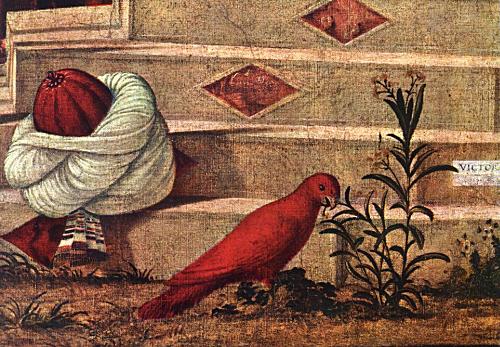
The Baptism of the Selenites
detail
Vittore Carpaccio
(1450-1525)
_______________________
At Allihies, Co. Cork
Michael McKimm
As if it wasn’t enough that we saw
the stonechat on the fencepost
feeding its chick on the loose barbed-wire,
or that we were surrounded by a lush
enriching mist that seemed to hold
the land as tight as cuckoo-spit,
you gave us a happy-as-larry
unsuspecting hare, a kestrel high in the hills,
snowy moths at the window;
...(more)
Magma 48
_______________________
Reading Borges After Benjamin:
Allegory, Afterlife, and the Writing of History
Kate Jenckes
(Suny Series in Latin American Thought)
mediafire pdf
What is often not acknowledged is that Borges was concerned with history as well as literary history and individual experiences of temporal- ity. His repeated insistence that life and representation exist in time re- sponds to the same questions of singularity and difference and the idea that life always exceeds its representations that Benjamin describes in “The Task of the Translator” as the nature of both life and history. The places in Borges’s writing that refute temporal linearity and a stable sense of identity demand that we learn to look for what has been left out of their constructions, both at a level of individual life history and larger narratives, such as national, imperial, or universal history. Paul de Man’s distinction that “temporality” denotes a passive unfolding, whereas “his- tory” introduces the possibility of interrupting such unfolding, allows us to understand what is most historical about Borges’s writings on time, life, and history. For Borges, as for Benjamin, the past is never dead, but can irrupt in the present and change the way we see the world. Lives and times that are left out of dominant narratives have the ability to interrupt those narratives, forcing us to acknowledge the structures of exclusion on which they are based. _______________________
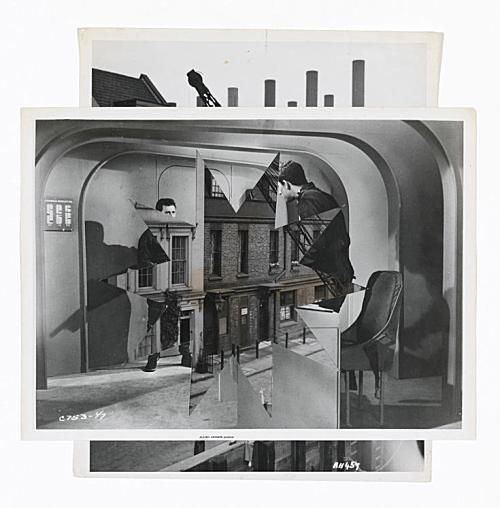 Flash X
2008
John Stezaker
Whitechapel Gallery
29 January - 18 March 2011 1 2 3 4
John Stezaker: What a carve upBrian Dillon The Guardian
(....)
He was not, of course, the first artist to deploy the found photograph, or combine such photographs, without comment. It was a favoured trick of his surrealist precursors, from Ernst to the pages of Georges Bataille's late-20s journal Documents. But it's important to gauge his careful distance from the tradition of photomontage – a term he avoids, in favour of "collage". As Stezaker sees it, the great monteurs such as John Heartfield and George Grosz always worked at some remove from the image itself – indeed, this was often the critical or satirical point of their work: to conjure radical ideas out of pictures that otherwise allured the everyday viewer. With his residual romanticism and often frank embrace of 20th-century glamour, Stezaker is perhaps closer to an artist such as Hannah Höch, whose Album of 1933 juxtaposes press imagery with ravishing fashion illustrations and fragments of a sublime or disturbing nature. In Stezaker's collages as in Höch's, images sidle up to and seduce one another, shying from overarching arguments or narratives.
(....)
The mystery of Stezaker's art may be said to reside in these precise and shocking cuts. He has spoken of the moment when he takes a blade to the sleek surface of an old bromide print as one of heightened anxiety and tension – having handled and gazed at these images for months or even years, he likes to get the incision over and done with as swiftly as possible. Unfinished works in his London studio have the look of gaping wounds, something like the suddenly opened slit, product of a slip of the thumb in the kitchen, described by Sylvia Plath's poem "Cut": "a sort of hinge / Of skin, / A flap like a hat, / Dead white." They remind us that historically photographs have been as much things to be touched as looked at, that our fascination with them is at once visual and tactile, almost grisly....(more)
via Joerg Colberg
_______________________

Marriage I
John Stezaker
2006
_______________________
A Spontaneous Human Combustion
Richard Ilnicki
Mohamed Bouazizi/Dec. 17th, 2010/Tunisia
The New Verse News
(....)
Red sky, red flag, red herring, red badge of courage
bring you to a new high, and your veins begin to smoke
with the smell of an undetected electrical fire.
The pain shifts back and forth across the international dateline
until you have no idea what day it is.
Frustration gift-wrapped as uncertainty takes root as bitterness
beneath the shameful tree of abuse.
In this jealous garden
tentacles fertilized with anger produce the lush fruit of hatred.
Finally, after all is said and done, swallowed alive and whole,
desperation engenders a sense of hopelessness.
You've spent your last emotional dime, and you can only watch
psychologically motivated memories arise
like a gaggle of gestalt geese gagging.
They are inviting you to join them south of the border.
Your hyper introspection irradiates flammable despair.
It burns your X-Ray to the nth degree,
smokes bonfire flames of vanity and peppers the clear blue sky
with imploding black holes.
You are now caught red-handed,
an incendiary who is immolating his carcinogenic self.
And vengeance is yours,
until the definitive intransigence of your meditative posture
brings you to a new high
just one degree above the highest....(more)
_______________________
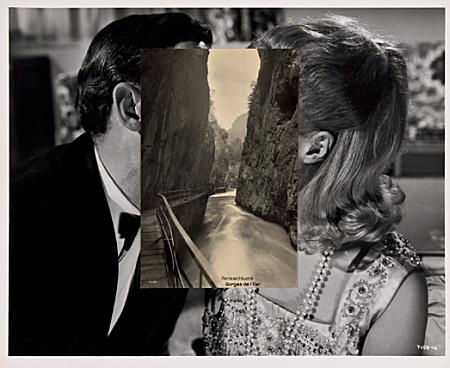
John Stezaker
_______________________
otoliths
southern summer, 2011
The Vast Practical Engine
Eric Hoffman
1.
the wood must be
frost-bitten and
dry, the
seeds must wither
and decay,
the action of leaves
reverse
the fragmented world
is in ruin, the same
world
intact is born
“never use the words
higher and lower” for
“the wind bloweth
where it listeth”
what is most continuous
is most profane, bundles
of observations
words and not world
the cosmos
is empty of idols
the universe
is weather
...(more)
_______________________
Against Expression: An Anthology of Conceptual Writing
Edited by Craig Dworkin & Kenneth Goldsmith
Northwestern University Press
Download Introductory Essays & Table of Contents [PDF]
seedy
_______________________
50 Best Blogs for Humanities Scholars
Online Education Database
via Farhang Erfani
|

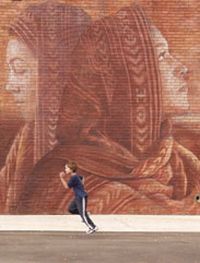 Janus Head
Janus Head

 The Age of Briggs & Stratton
The Age of Briggs & Stratton







































